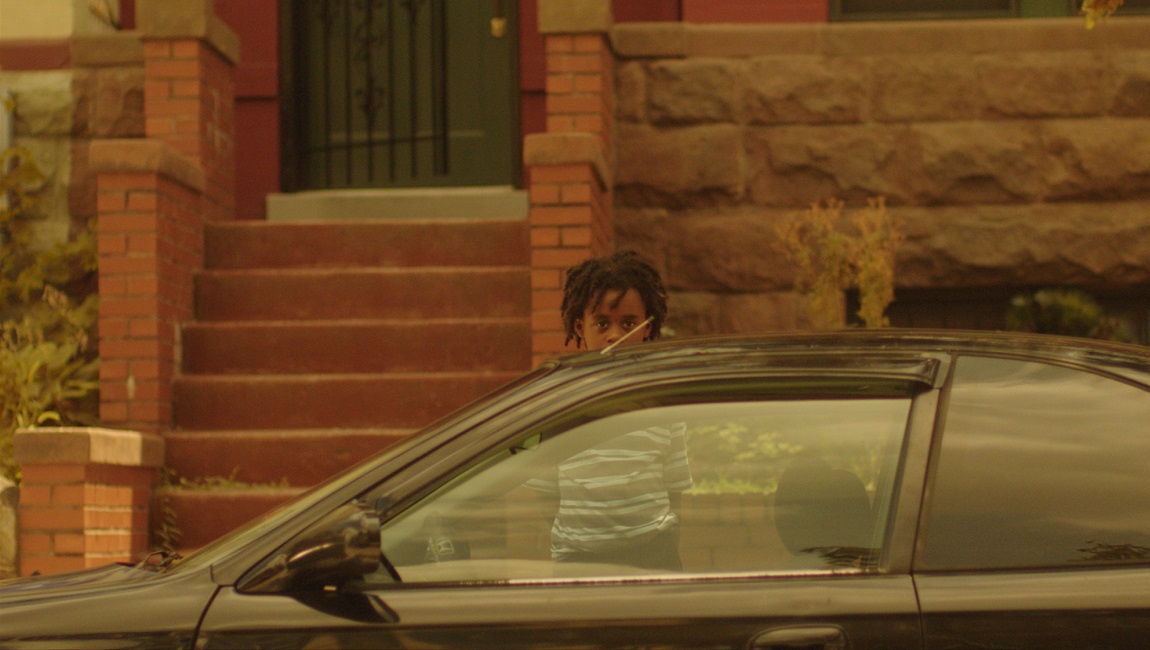Residue is a singular, important achievement, a work of shattering beauty and necessary discourse.
Director Merawi Gerima was born into an impressive cinematic lineage. His father is Haile Gerima, a foundational member of the L.A. Rebellion, and at its best the younger Gerima’s feature debut, Residue, recalls the early lo-fi work of such movement luminaries as Charles Burnett and Julie Dash. Its attention is certainly fixed in the same direction — Black working-class communities and difficulties specific to such ecosystems — but here accounts for 21st-century gentrification. The film’s structuring narrative is loose autofiction: a young filmmaker, Jake (Obinna Nwachuwu), who has been living and studying in California, returns to the D.C. neighborhood of his childhood in order to write a script inspired by its forced evolution. Early on, Residue works through expected conflicts: Jake’s parents are forced to contend with relentless, acquisitive property flippers; his old friends regard his sudden presence and questions with suspicion; a general tension between his present and past life begins to build. Other conflicts are more surprising: Jake’s close childhood friend, Demetrius, is nowhere to be found, and people don’t want to talk about it.
This sense of unease builds across the film’s runtime, and informs its matching visual aesthetic. Both Residue’s guiding structure and individual scenes are handled with an impressionistic touch; Gerima pitches both the mundane and the more mysterious interactions at the tenor of a fever dream. Gerima shoots with a handheld camera and primarily employs tight framing to build a sense of visual intimacy, but also occasionally disrupts this mode with vertical camera flips and ethereal, Malickian narration. Another memorable composition finds Jake’s parents using a slide projector to cast baby pictures through an open doorway and onto a wall already dotted with framed family photos. More foundational to the film is how Gerima intercuts Jake’s re-navigation of his neighborhood with flashbacks and dream sequences, moving from digital compositions in the present to grainy past remembrances steeped in violence and repressed trauma. Memory is fluid here, reaching into the past and slipping back into the present, upsetting Jake’s stability. His growing dismay with the community, which starts to manifest as emotional disarray, recalls the psychological disorientation of early Polanski, but here emerges from a specific reconfiguration of one’s reality rather than an untethering from it.
Residue also features a pair of the year’s best scenes, which each illustrate both the director’s precise voice and eye. In one, while Jake visits a friend in prison, Gerima shoots the scene from two perspectives: the first finds the pair chatting and emoting, in a tight two-camera close up, through a smudged glass partition; the second intercuts the first, continuing the same conversation in voice-over, as the two grown men wrestle and laugh in a verdant forest glen. It’s a shattering moment, an image of shared and desperate nostalgia for a past that never was, and a direct contrast with the brutal childhood memories that litter the rest of the film. Residue’s other great moment comes at its end when, after a violent eruption, Jake flees from pursuing cops, the camera watching as he rounds a corner and continues his flight before it pulls back and up, situating itself in between a young white couple who briefly watch and comment on the action from their apartment balcony before returning to idle millennial chitchat. The rest of Gerima’s film doesn’t always strike quite the same balance of understated feeling and poetical artistic flourish, sometimes bordering on self-conscious opaqueness, but it reflects a discursively nuanced and visually distinct DIY vision unburdened of Hollywood filmmaking expectations or pandering neoliberal hegemony. In a year where traditionally accepted power structures are being questioned and condemned with increasing ferocity, Residue is a minor revolution of its own.
You can stream Merawi Gerima’s Residue on Netflix beginning on Sept. 17.







